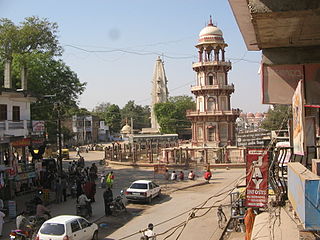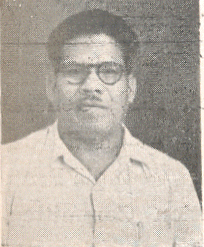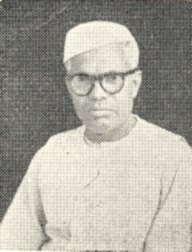Related Research Articles

Sabarkantha district is one of the 33 districts of Gujarat state of India,located in the northeastern part of the state. The administrative headquarters of the district are located in Himatnagar.

Banaskantha district is one of the thirty-three districts of the Gujarat state of India. The administrative headquarters of the district is at Palanpur which is also its largest city. The district is located in the Northeast of Gujarat and is presumably named after the West Banas River which runs through the valley between Mount Abu and Aravalli Range,flowing to the plains of Gujarat in this region and towards the Rann of Kutch. The district is famous for the Ambaji temple which draws many tourists. It covers an area of 12703 km2 and is the second largest district in the state.

Patan district is one of the 33 districts of Gujarat state in western India. Its main city is Patan. This district is located in northern Gujarat and bounded by Banaskantha district in the north and northeast,Mehsana district in the east and southeast,Surendranagar district in the south and Kutch District and the Kutch nu Nanu Ran in the west. The district occupies an area of 5792 km2.

Mehsana district is one of the 33 districts of Gujarat state in western India. Mehsana city is the administrative headquarters of this district. The district has a population of over 1.8 million and an area of over 4,500 km2. There are over 600 villages in this district with a population of 2,035,064 of which 22.40% were urban as of 2011.

Vadodara district,also known as Baroda district,is situated in the eastern part of the state of Gujarat in western India. The administrative headquarters of the district is the city of Vadodara (Baroda). The district covers an area of 7,794 km2 and had a population of 4,165,626 as of 2011. Out of this population,49.6% were urban,50.4% were rural,5.3% were Scheduled Castes and 27.6% were Scheduled Tribes. As of 2011,Vadodara district is the third most populous district of Gujarat,out of 33 districts in the state.
Harisinh Pratapsinh Chavda was a member of the 14th Lok Sabha of India. He represented the Banaskantha constituency of Gujarat and is a member of the Indian National Congress.

Mohan Sanjibhai Delkar was an Indian politician and tribal rights advocate,who was elected seven times as a member of Lok Sabha from Dadra and Nagar Haveli constituency,in the Union Territory of Dadra &Nagar Haveli and Daman &Diu. He had been part of Indian National Congress (INC),Bharatiya Janata Party (BJP) and Janata Dal (United) (JDU) at various times,and had also founded his own party Bharatiya Navshakti Party for some period.

Nand Kumar Sai is an Indian politician. He is former member of the Indian National Congress and also Bharatiya Janata Party. He was elected to the Lok Sabha,1989–1991 and 1996–1998,from Raigarh when it was in Madhya Pradesh. In 2004 he was elected a member of the 14th Lok Sabha representing Surguja constituency of Chhattisgarh. He was elected a Rajya Sabha MP from Chhattisgarh in 2009 and 2010. He remained an MP until 2016.

General elections were held in India between 25 October 1951 and 21 February 1952,the first national elections after India attained independence in 1947. Voters elected 489 members of the first Lok Sabha,the lower house of the Parliament of India. Elections to most of the state legislatures were held simultaneously.

Banaskantha is one of the 26 Lok Sabha constituencies in Gujarat,state in western India.

The Gujarat Legislative Assembly or Gujarat Vidhan Sabha is the unicameral legislature of the Indian state of Gujarat,in the state capital Gandhinagar. Presently,182 members of the Legislative Assembly are directly elected from single-member constituencies (seats). It has a term of 5 years unless it is dissolved sooner. 13 constituencies are reserved for scheduled castes and 27 constituencies for scheduled tribes. From its majority party group or by way of a grand coalition cabinet of its prominent members,the state's Executive namely the Government of Gujarat is formed.
Kirit Premjibhai Solanki is an Indian Politician and medical practitioner who has been elected Member of Parliament of India for three consecutive terms. He represents the Ahmedabad West constituency of Gujarat and is a member of the Bharatiya Janata Party political party. Currently,he has been appointed as the chairman of the Parliamentary Committee on the Welfare of Scheduled Castes and Scheduled Tribes. He is also part of the panel of chairpersons who preside over the House in the absence of the Speaker and the Deputy Speaker. He is one of the most active members in the parliament and had nearly 100% attendance in the 15th and 16th Lok Sabha. He has been awarded the Shreshth Sansad Award consecutively twice in 2018 and 2019 for his active work in the parliament and constituency.

Haribhai Parthibhai Chaudhary is an Indian politician and was the Minister of State for Coal and Mines in government of India. He represents the Banaskantha constituency of Gujarat and is a member of the Bharatiya Janata Party political party.

Jasvantsinh Sumanbhai Bhabhor is a former Minister of State for Tribal affairs in the Government of India,an Indian politician,and a member of parliament to the 16th Lok Sabha and the 17th Lok Sabha from Dahod,Gujarat. He won the 2014 Indian general election,being a Bharatiya Janata Party candidate.
Vadgam is one of the 182 Legislative Assembly constituencies of Gujarat state in India. It is part of Banaskantha district,numbered as 11-Vadgam and is reserved for candidates belonging to the Scheduled Castes. It falls under the Patan Lok Sabha constituency.
Narayan Sadoba Kajrolkar was an Indian independence activist,Gandhian and social worker,best known as the man who defeated B. R. Ambedkar in a general election. A Marathi by birth,he served as a personal assistant to Ambedkar,before contesting against him in the first Lok Sabha elections from the Mumbai North Central constituency in 1952 and defeated the latter by over 15000 votes. He was also elected from the same constituency for a second time in the 1962 elections.

Dr. Natabar Pandey was an Indian politician. He represented the Sambalpur constituency in the 1st Lok Sabha elected in 1952.
Zohraben Akbarbhai Chavda (1923–1997) was a Gandhian social reformer and member of the 3rd Lok Sabha from Banaskantha.

Ram Ratan Ram (1921–2002) was an Indian politician. He was a Member of Parliament and former General Secretary,Indian National Congress. He served as social worker and advocate,under the mentorship of Bose. He was elected to the Bihar Vidhan Sabha in 1952 and won every consecutive election till his move to the centre in 1984. Ram was elected to the Lok Sabha,the lower house of the Parliament of India from Hajipur in Bihar as a member of the Indian National Congress.

C Krishnan Nair (1902–1986) was an Indian politician of the Indian National Congress,an Indian Independence activist,a Gandhian who participated in the Salt March of 1930 and a Member of the Indian Parliament of the First and Second Lok Sabha. He was popularly known as Delhi Gandhi or Nairji.
References
- ↑ India. Parliament. Lok Sabha (2003). Indian Parliamentary Companion: Who's who of Members of Lok Sabha. Lok Sabha Secretariat. p. 96. Retrieved 14 May 2019.
- ↑ Devavrat N. Pathak; Mathuradas Govindji Parekh; Kirtidev Dahyabhai Desai (1966). Three general elections in Gujarat: development of a decade, 1952-1962. Gujarat University. p. 156. Retrieved 14 May 2019.
- ↑ India. Commissioner for Scheduled Castes and Scheduled Tribes (1953). Report of the Commissioner for Scheduled Castes and Scheduled Tribes. Manager, Government of India Press. p. 13. Retrieved 14 May 2019.
- 1 2 3 4 5 "Pioneer Founder – Sarvodaya Ashram Sanali" . Retrieved 8 June 2023.
- ↑ "About Us – Sarvodaya Ashram Sanali" . Retrieved 8 June 2023.